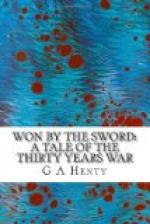“Why not go there at once, master?”
“Because I think that the fresh air of the lake will brace me up, and maybe if I find the people too sober minded for me we will go up into the mountains and lodge there in some quiet village. I think that would suit both of us.”
“It would suit me assuredly,” Paolo said joyfully. “I love the mountains.”
Such was indeed the course eventually taken. The strict Calvinism of Geneva suited neither of them; and after a fortnight’s stay there they went up among the hills, and in the clear brisk air Hector found his blood begin to run more rapidly through his veins, and his strength and energy fast returning. Sometimes he rode, but soon found more pleasure in climbing the hills around on foot, for the mountain paths were so rough that it was seldom indeed that his horse could break into a trot.
CHAPTER VII: THE DUC D’ENGHIEN
From time to time news came up of what was passing in the world. The Spaniards had afforded no assistance in men to the duke, for Richelieu had sent a powerful army into the heart of Flanders, and so kept them fully occupied. An Austrian force, however, joined that of the duke, and a battle was fought with the royal army which, under Marshal Chatillon, lay encamped a league from Sedan. The Austrian general commanded the main body, the Duc de Bouillon the cavalry, while the Count de Soissons was with the reserve. At first Chatillon’s army had the advantage, but Bouillon charged with such vehemence that he drove the cavalry of the royalists down upon their infantry, which fell into confusion, most of the French officers being killed or made prisoners, and the rest put to rout. The duke, after the victory, rode to congratulate Soissons, whose force had not been engaged. He found the count dead, having accidentally shot himself while pushing up the visor of his helmet with the muzzle of his pistol.
Bouillon soon learned the hollowness of the promises of his allies. The Spaniards sent neither money nor men, while the Austrians received orders to march away from Sedan and to join the Spaniards, who were marching to the relief of Arras.
The duke, deserted by his allies, prepared to defend Sedan till the last. Fortunately for him, however, the position of the French at Arras was critical. The place was strong, two armies were marching to its relief, and it would therefore have been rash to have attempted at the same time the siege of Sedan. The king himself had joined the army advancing against Bouillon, while the cardinal remained in Paris. Many of those round the person of the king, foremost among whom was the Marquis of Cinq-Mars, his master of horse, spoke very strongly in favour of the duke, and represented that he had been driven to take up arms by the persecution of the cardinal. The king was moved by their representations, and gave a complete pardon to Bouillon, who was restored to the full possession of all his estates in France, while on his part he released the prisoners, baggage, and standards taken in the late battle.




